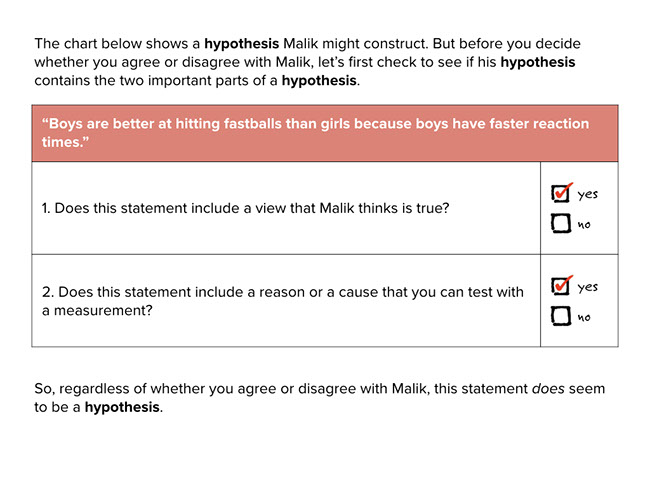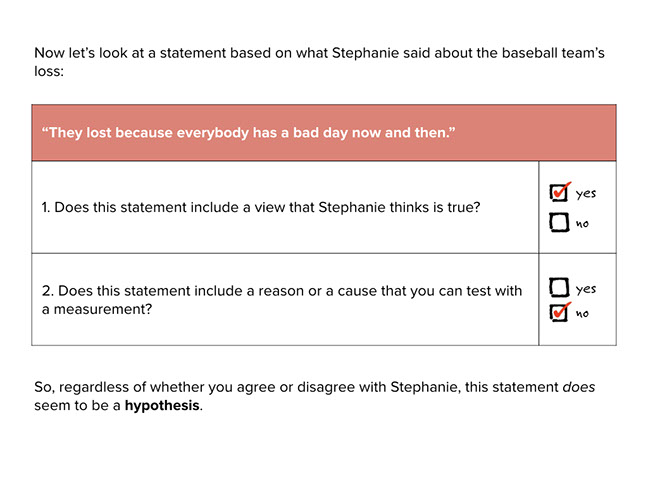SciGen Teacher Dashboard
Unit T5
Exploring a Hypothesis
Lesson: Constructing a Hypothesis
Duration: Approximately 50 minutes
Students learn the essential elements of a scientific hypothesis and learn to identify whether or not a statement contains these essential elements. Additionally, students learn to write a detailed procedure for a science experiment.
LEARNING OBJECTIVE
Students understand the essential components of a hypothesis.
Teacher Tune-up
Teaching Notes
ACTIVITY OVERVIEW
- Introducing the concept of hypothesis (10 minutes)
- Working with examples as a class (20 minutes)
- Working with examples individually or in groups (20 minutes)
Introducing the concept of hypothesis (10 minutes)
:
When we construct a scientific hypothesis, we include:
- a view that states what we think is true and
- a reason or cause that we can test with a measurement.
Working with examples as a class (20 minutes)
Both examples include two statements from the script of the scene about reaction times in baseball.
The first is Malik’s hypothesis that “Boys are better at hitting fastballs than girls because boys have faster reaction times.” This statement has both elements.
It’s important that students recognize that regardless of our feelings or experiences, a statement that contains the essential elements is indeed a scientific hypothesis.
The second model includes Stephanie’s statement that “They lost because everybody has a bad day now and then.” While this statement has a view that Stephanie believes is true, the reason or cause cannot be tested with a measurement. Some students may insist that this can be tested with a measurement. If they do, encourage them to think about how they would measure having a bad day “now and then.” While Stephanie’s statement may be true, it cannot be a scientific hypothesis because it lacks the second element.
There are other correct ways to frame a hypothesis, such as using an if/then statement.
See here for an explanation of this alternate structure as well as an introduction to the terms dependent and independent variable.
Working with examples individually or in groups (20 minutes)
Students identify whether or not a statement can be considered a hypothesis.
Check off whether or not the statement contains the components of a hypothesis.
Students write a brief explanation of their thinking for each statement.
:
- George:
- George’s statement is a hypothesis because it includes both of the essential parts. First, he states his view that he believes fish are dying because of the pollution from the factory. The cause can be tested with a measurement because someone could measure the amount of pollution found in the stream.
- Christina:
- Christina’s statement contains the essential elements of a hypothesis because she can measure the amount of hours that students study and see if those who study more get higher grades. Because her statement includes a view that she thinks is true and a reason that can be tested with a measurement, Christina’s statement is a hypothesis.
- Tashia:
- Tashia’s statement is not a hypothesis because it does not contain a cause or reason that can be measured.

BETA Version - Please send comments and corrections to info@serpinstitute.org

